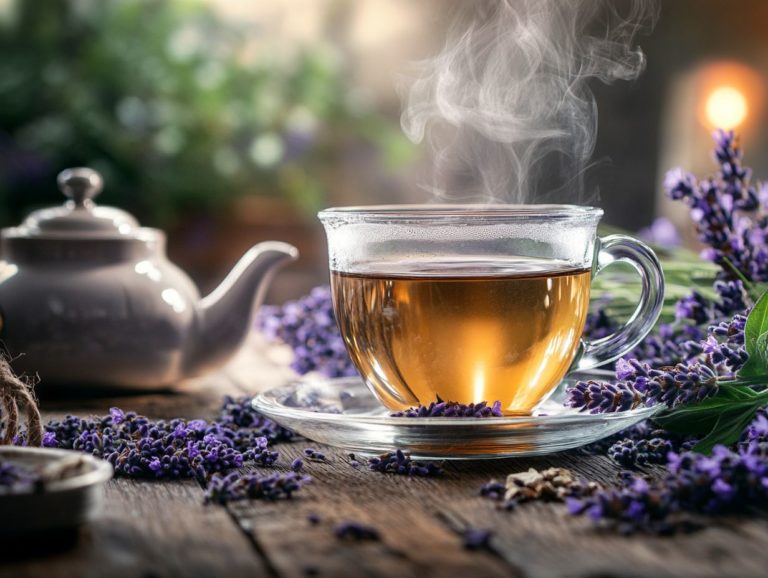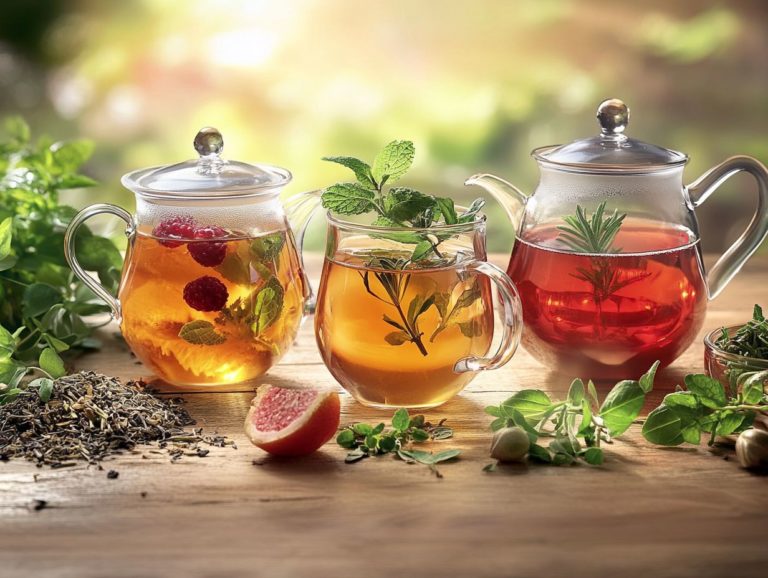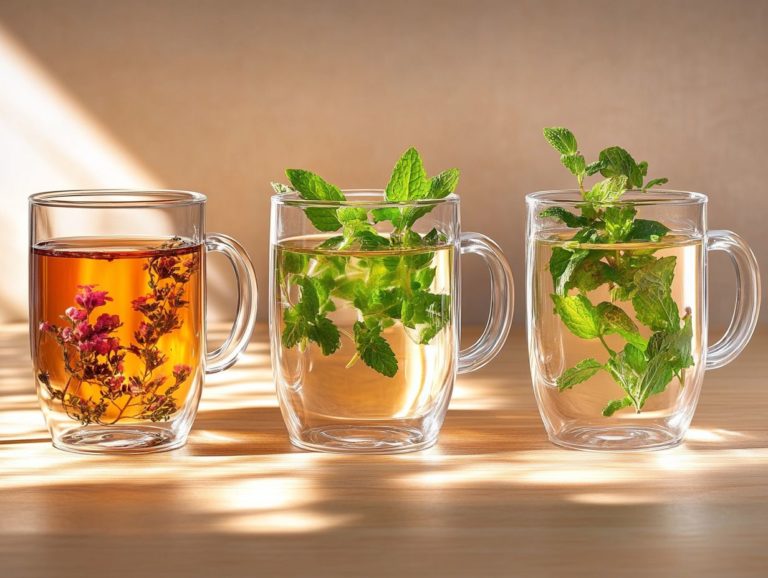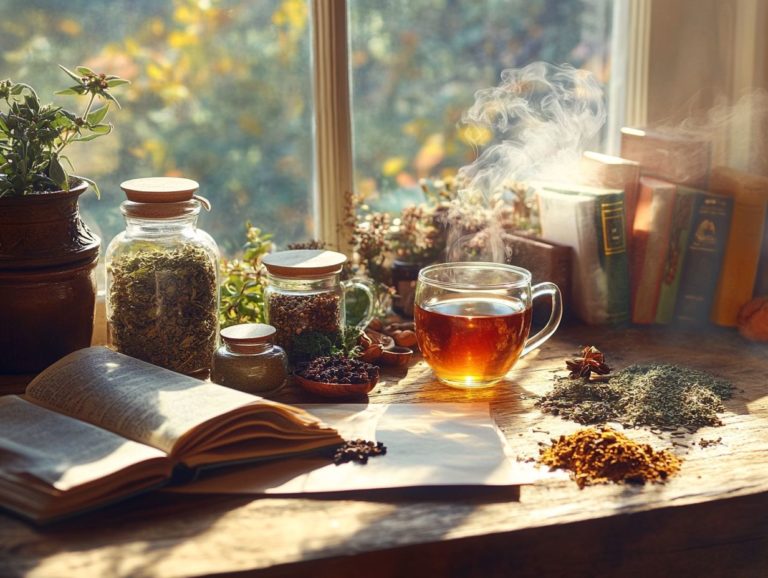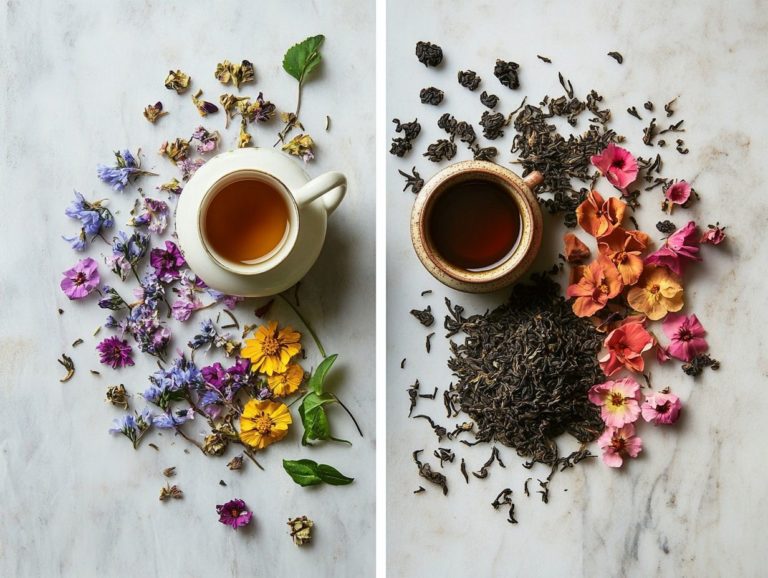Herbal Tea and Its Role in Holistic Health
Herbal tea has captivated the hearts of wellness enthusiasts and casual drinkers alike. It presents a flavorful and nurturing approach to enhancing both physical and mental well-being. With many health benefits, herbal tea contributes to overall health.
This exploration delves into the rich world of herbal teas, showcasing the diverse varieties available and their numerous benefits. You will uncover the secrets to brewing the perfect cup and discover how to effortlessly weave these calming infusions into your holistic lifestyle.
We will also discuss some potential risks to consider. Join us on this exciting journey toward better health through the enchanting realm of herbal tea!
Contents
- Key Takeaways:
- What is Herbal Tea?
- Benefits of Herbal Tea
- How to Prepare and Enjoy Herbal Tea
- Incorporating Herbal Tea into a Holistic Lifestyle
- Potential Risks and Considerations
- Frequently Asked Questions
- What is herbal tea and how does it play a role in holistic health?
- What are the different types of herbal tea and their benefits?
- Is herbal tea safe for everyone?
- Can herbal tea be used as a replacement for medication?
- How does herbal tea promote holistic health?
- Are there any potential side effects of consuming herbal tea?
Key Takeaways:
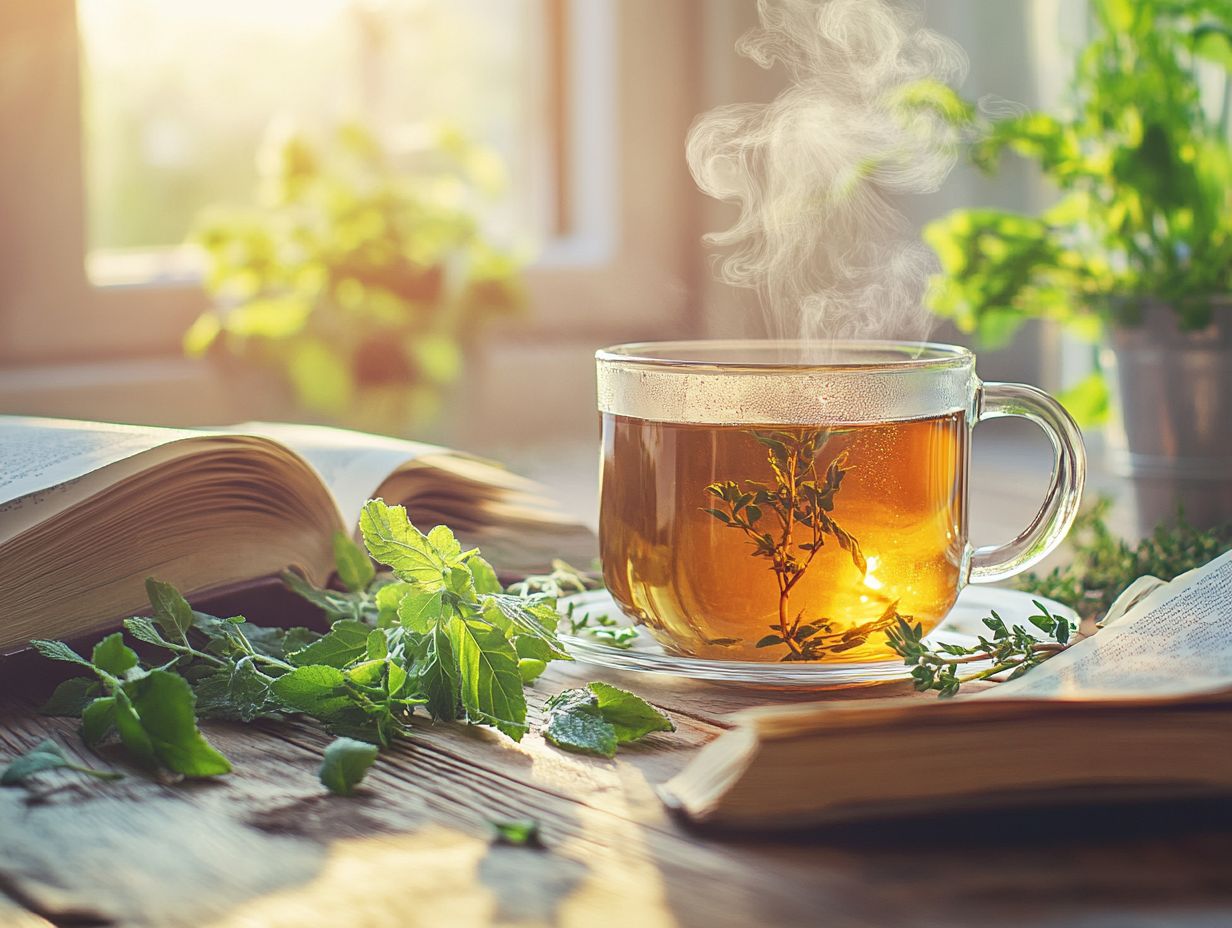
- Herbal tea is a caffeine-free beverage made from steeping various plant materials and has been used for centuries for its natural healing properties.
- The consumption of herbal tea can contribute to overall physical and mental well-being, such as reducing inflammation, improving digestion, and promoting relaxation.
- To fully incorporate herbal tea into a holistic lifestyle, it is important to practice mindful consumption and consider potential interactions and side effects. Explore complementary practices such as meditation and yoga.
What is Herbal Tea?
Herbal tea is a naturally infused beverage crafted from a rich array of plants, herbs, and flowers. It is celebrated for its exquisite flavors and many health benefits, including vitamins and minerals that support overall wellness. Unlike traditional teas that come from the Camellia sinensis plant, herbal teas offer a delightful variety of ingredients, including chamomile, peppermint, and ginger. This allows for exceptional versatility and personalization to suit your unique tastes.
Whether enjoyed hot or iced, these infusions deliver soothing properties while enhancing your holistic wellness. For those interested in specific benefits, herbal tea for heart health can seamlessly integrate into your daily rituals.
Different Types of Herbal Tea
You ll discover a delightful array of herbal teas, each boasting unique flavors and benefits that can elevate your daily routine. Consider chamomile tea for its calming effects, peppermint tea to support digestion, and ginger tea to boost your immunity.
Hibiscus tea stands out with its tart flavor, full of antioxidants that help protect your body and promote heart health while regulating blood pressure. Then there’s rooibos, from South Africa, known for its naturally sweet and creamy profile. It s caffeine-free and packed with essential minerals like zinc and magnesium.
Echinacea tea is a popular choice for its immune-boosting properties, especially during cold and flu seasons. Let s not forget turmeric tea, known for its anti-inflammatory benefits, contributing to your overall wellness and potentially helping with conditions like dementia. Each of these herbal selections enhances your culinary experience and acts as a natural remedy for various ailments.
Benefits of Herbal Tea
Herbal teas offer a wealth of health benefits, making them vital elements of a comprehensive wellness strategy designed to elevate both your physical and mental well-being.
Imagine the invigorating effect of ginger tea, which can bolster your immune system, or the soothing embrace of chamomile tea, perfect for alleviating stress. These natural remedies are brimming with antioxidants, helping to promote heart health, and essential nutrients that can significantly enhance your overall health.
Try adding chamomile or ginger tea to your routine for fantastic benefits!
Physical and Mental Health Benefits
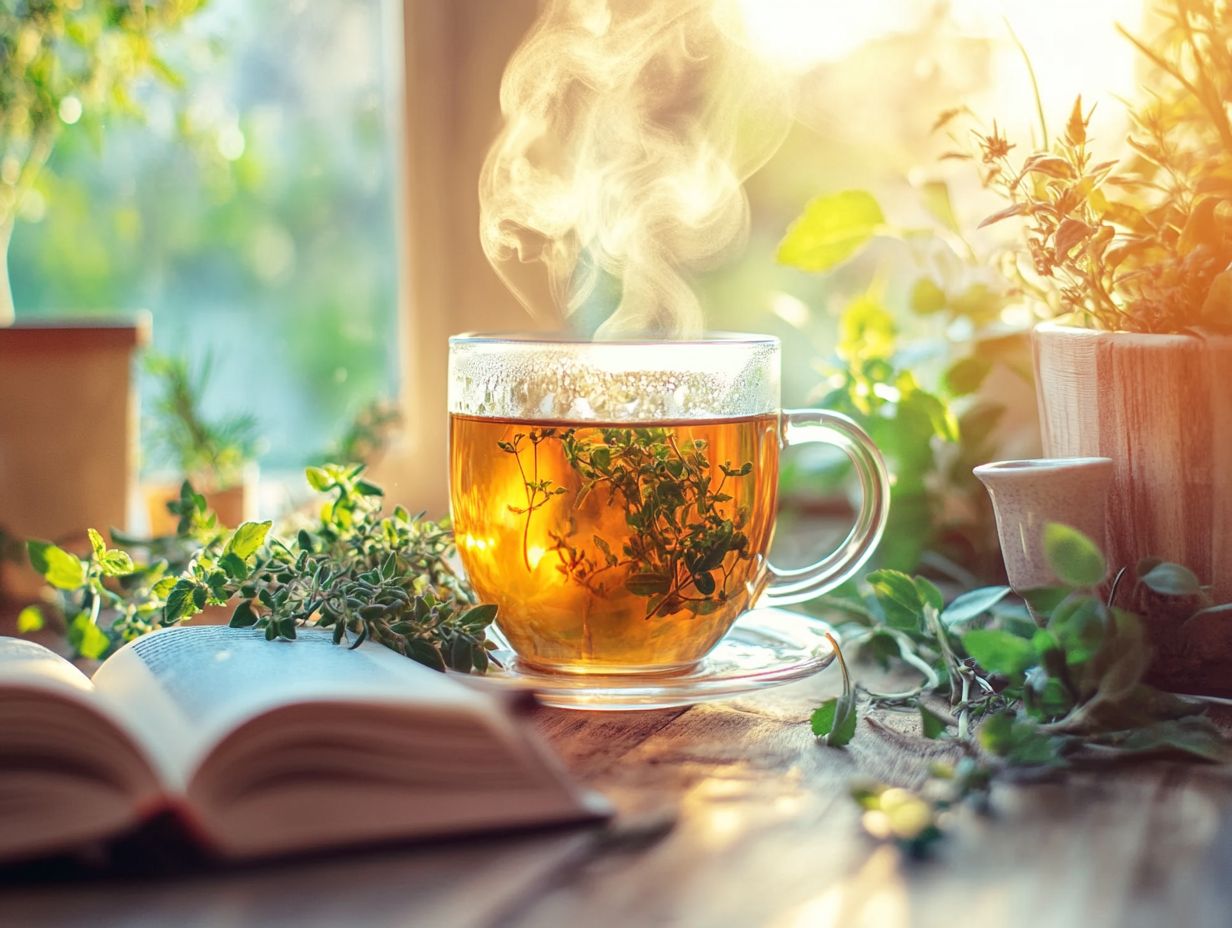
The physical and mental health benefits of herbal tea are extensive. These infusions are essential for your overall health and provide effective weight management. They can enhance your immune function, boost immunity, improve digestion, and assist in weight management. Additionally, herbal teas offer natural remedies for stress relief and promote an overall sense of calm.
Chamomile tea is well-known for its calming effects. It helps reduce anxiety and promotes better sleep, so you wake up feeling refreshed and focused. Peppermint tea soothes digestive discomfort and acts as a natural energy booster thanks to its invigorating aroma. Incorporating herbal tea: a natural approach to wellness can enhance your overall well-being.
Hibiscus tea, rich in antioxidants, supports heart health and helps regulate blood pressure. This showcases how your choices in herbal teas can enhance both physical well-being and mental clarity. By weaving these herbal remedies into your daily routine, such as chamomile, peppermint, and ginger tea, you can start enjoying these amazing health benefits today! To learn more about the roots of these beverages, check out the history of herbal tea: from ancient times.
How to Prepare and Enjoy Herbal Tea
Making herbal tea is a fun and rewarding experience! You can explore various brewing techniques to customize flavor and elevate health benefits.
Whether you choose to steep loose-leaf herbal tea or prefer the convenience of tea bags, the right preparation can amplify those soothing properties, ensuring a delightful experience with every sip.
How to Brew and Enjoy Herbal Tea
There are numerous brewing techniques that can enhance the flavor and health benefits of herbal tea. This allows you to extract the best from ingredients like chamomile, peppermint, and ginger. By mastering these methods from steeping times to infusion techniques you can elevate your daily tea ritual into a delightfully enriching experience.
Each variety, such as rooibos, echinacea, or hibiscus, requires your careful attention to temperature and duration. For example, chamomile thrives when steeped in water just below boiling for about five minutes. Meanwhile, peppermint reveals its charm with a cooler brew at around 180 F for approximately eight minutes.
To elevate your tasting experience, consider blending herbs. Pairing ginger with lemon balm amplifies both flavor and soothing qualities. Combine ginger and lemon balm, simmer for ten minutes, then strain to create a delightful infusion.
These mindful preparation techniques not only deliver rich flavors but also encourage precious moments of mindfulness and relaxation.
Incorporating Herbal Tea into a Holistic Lifestyle
Incorporating herbal tea into your holistic lifestyle significantly enhances your overall well-being. It effortlessly fits into your daily routines while promoting natural remedies for stress reduction and improving digestion.
By weaving herbal infusions into your wellness plan, you can experience a multitude of benefits, including stress relief, effective weight management, and bolstered immune function. Exploring understanding herbal tea: types and benefits can enhance your journey towards better health.
Complementary Practices and Mindful Consumption
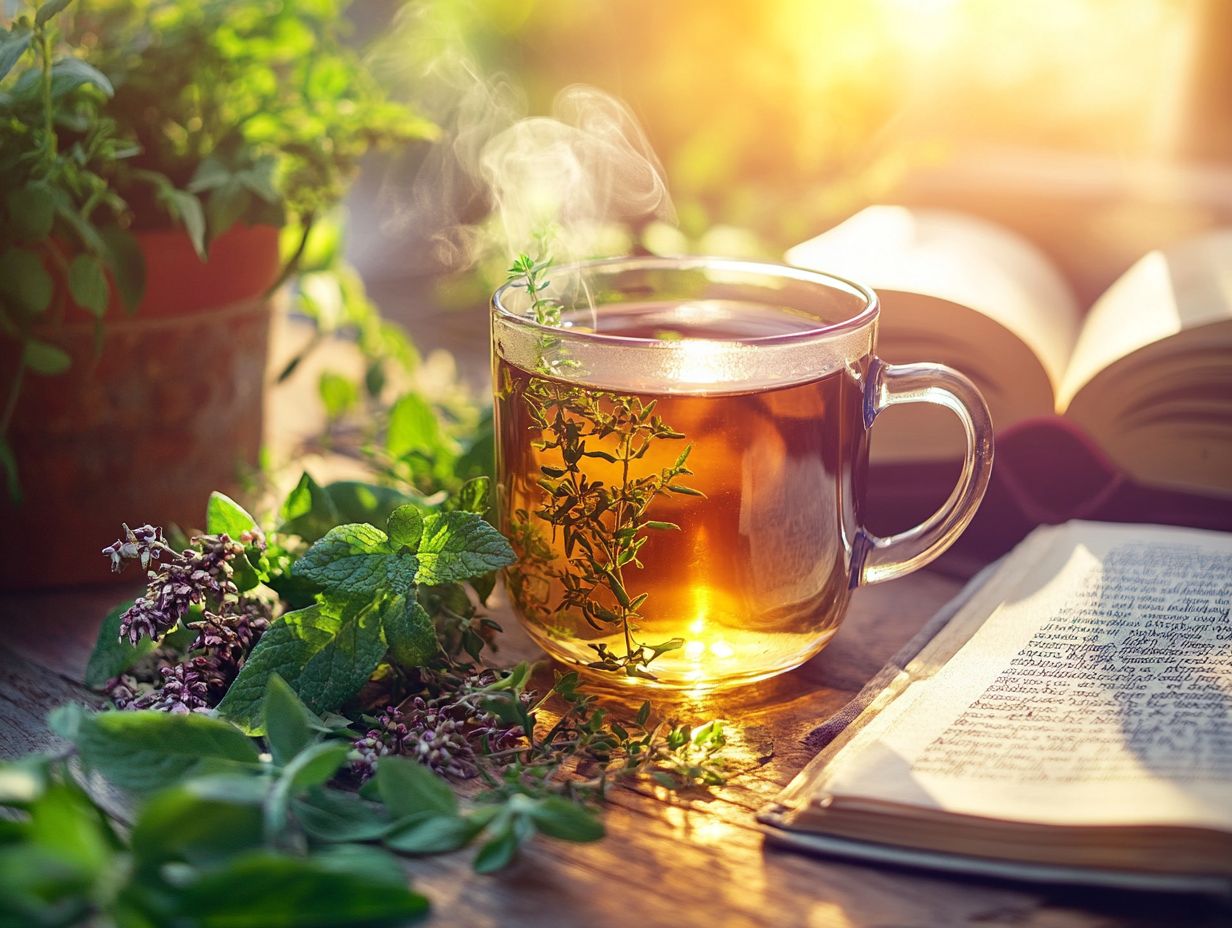
Mindful consumption of herbal tea, coupled with complementary practices like yoga, is essential for nurturing overall health and cultivating a serene atmosphere. Engaging in rituals that encourage relaxation like savoring a cup of chamomile or peppermint tea can significantly enhance your stress reduction and overall well-being.
To elevate this experience, consider integrating practices such as meditation or yoga. These practices can create a serene atmosphere that deepens your connection to the present moment. Pairing a calming herbal blend with a brief meditation session can amplify the soothing effects, allowing you to truly relish each sip of tea while enjoying the benefits of drinking herbal tea daily.
This mindfulness enhances the benefits of herbal infusions, including the role of herbal teas in weight loss, and cultivates a deeper appreciation for the rich flavors and aromas in every cup. Adopting this holistic approach to tea drinking fosters greater well-being and invites a profound sense of peace into your daily life.
Potential Risks and Considerations
While herbal tea presents a wealth of benefits, be mindful of the potential risks and considerations that come with its consumption. Certain herbal ingredients might interact with specific medications or may not be suitable for particular health conditions.
Taking precautions when integrating these natural remedies into your diet is essential for ensuring well-being.
Possible Interactions and Side Effects
Herbal teas, while generally safe, can come with their own set of side effects or interactions with certain medications. Stay informed about these potential risks. Ingredients like echinacea, turmeric, and rose hip can have unexpected interactions, so understanding these nuances will ensure that your tea consumption is both safe and beneficial.
Some individuals might experience allergic reactions or digestive discomfort when sipping chamomile, especially if they have allergies to related plants. Similarly, licorice root can raise blood pressure, so if you’re on hypertensive medications, approach it with caution. For those interested in enhancing their tea experience, exploring the art of herbal tea blending is essential to remain vigilant about these potential interactions.
Consulting healthcare professionals about potential interactions with medications can help clear up any uncertainties and provide personalized guidance, ensuring your tea-drinking experience enhances well-being instead of jeopardizing it. Exploring 5 herbal teas for better skin health allows you to savor diverse flavors and health benefits while minimizing risks.
Frequently Asked Questions
What is herbal tea and how does it play a role in holistic health?
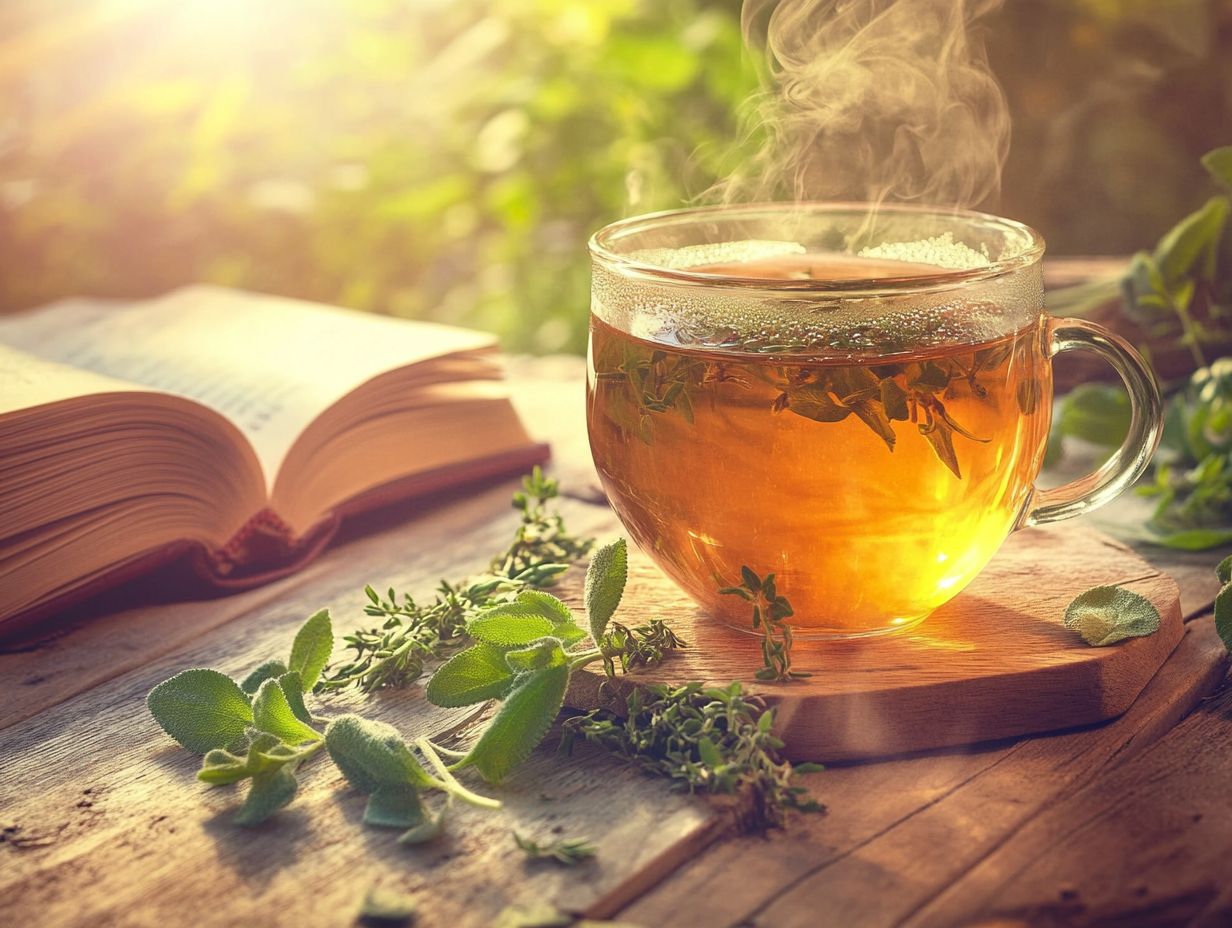
Herbal tea, including loose leaf herbal tea, is a beverage made from dried herbs, fruits, and spices steeped in hot water. Known for various health benefits, it is often used as a natural remedy for different health conditions. Its role in holistic health is to promote overall well-being by nourishing the mind, body, and spirit.
What are the different types of herbal tea and their benefits?
There are many types of herbal tea, each with its unique benefits. Some popular options include:
- Chamomile tea for relaxation
- Peppermint tea for digestion
- Ginger tea for nausea
- Hibiscus for heart health
It’s important to research and choose the right type of herbal tea for your specific health needs, considering options like rooibos, echinacea, and rose hip for their unique benefits.
Is herbal tea safe for everyone?
In general, herbal tea is safe for most people. However, individuals with certain health conditions, especially those related to digestive health or immune function, should consult with their doctor before consuming herbal tea. Pregnant or breastfeeding women, children, and those taking certain medications may need to avoid or limit their intake.
Don t miss out on the amazing benefits of herbal tea! Explore options tailored to your needs for a healthier lifestyle.
Can herbal tea be used as a replacement for medication?
No, herbal tea should not be used as a replacement for medication prescribed by a doctor.
Herbal tea can enhance an overall wellness routine. Ingredients like bee pollen, which comes from flower pollen, and propolis, a resin made by bees, provide soothing effects.
How does herbal tea promote holistic health?
Herbal tea promotes overall wellness by providing a natural source of vitamins, minerals, and antioxidants, which help boost immunity and improve digestion.
It helps reduce stress and promotes relaxation. Preparing and enjoying herbal tea calms the mind and body, making it a delightful part of your wellness journey!
Are there any potential side effects of consuming herbal tea?
In most cases, herbal tea is safe and has minimal side effects.
Be aware of allergic reactions or interactions with medications. Certain herbs, like chamomile, peppermint, and ginger, may cause adverse effects. Always consult with a healthcare professional regarding your health decisions.

